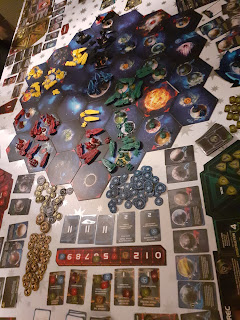- The Horus Heresy: Legion, Dan Abnett
"Brother Alpharius, be so kind as to pass me my powerful Astares binoculars."
"Yes, Brother Alpharius."
- Alpharius, probably
After the previous novel's post-technological fantasy, here's Dan Abnett with a total change of pace and scenery. The previous Abnett book in the series was the first one, and it was probably the best one so far, so I'm actually kinda expecting something.
**
As it happens, I was not disappointed. Legion is really good.
I'll get the bad stuff out of the way first. Some of Legion is very silly, even by the standards of this series, and the endless macho posturing starts getting very boring very quickly. Abnett is very sure to let us know that everyone is dead 'ard or whatever, and keep letting us know. It's actually very much like the characters in Darktide, which uncoincidentally boasts Abnett as a writer, and which I may have compared to a Guy Ritchie gangster movie parody.
Luckily, even though Legion shares some of the macho stupidity of Lock, Bolt and Two Smoking Barrels 40,000, the British entertainment product it far more closely resembles is 'Allo 'Allo. We have a main character who works undercover, pursues a totally unlikely romance, more or less disguises himself as an onion seller, and tries to stay alive amidst the conflicting schemes of a foreign intelligence organization, the army, the secret police and the Alpha Legion. Go on, tell me Lord Commander Namatjira isn't General von Klinkerhoffen, or that you can't see John Grammaticus bemoaning what a tangled web we weave.
The one disappointment in all this is that as a mirror image of the macho bullshit, Legion objectifies women in a way that Horus Rising very notably didn't. Or I mean to put it another way, I'm sure there was a very solid plot reason to create an Imperial Army regiment that has a permanent cadre of horny teenage girls. It's not bad by mil-sf standards, but combined with the very manly soldier men being dead butch, it starts to get quite tiresome.
What rescues Legion from its flaws is the plot, and especially the Alpha Legion. It starts out as a decently entertaining spy thriller that aspires to Alistair Maclean, and turns into space opera. This is a combination that's intensely Warhammer, especially if you remember that the previous novel was a post-technological Arthurian romance, which makes a wonderful combination. It's also very enjoyable, and clearly rises in quality toward the end.
There are many good characters in Legion, but the ones who really steal the show are the Astartes. In one early scene, there's an Alpha Legion marine pretending to be their Primarch, and another one pretending to be their other Primarch pretending to be a regular marine. And it only gets better from there. When I looked into 28mm Horus Heresy, I found the Alpha Legion interesting; now I'm trying paint schemes for them in 8mm.
**
So far, Legion is the best Horus Heresy novel. Do read it.











